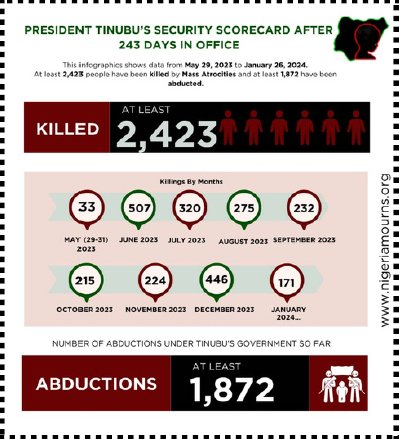Civil Society Organizations in Nigeria under the auspices of the Civil Society Joint Action Group, Community of Practice Against Mass Atrocities, and, Nigeria Mourns, are deeply concerned by the deteriorating state of security across Nigeria and its Federal Capital Territory, Abuja.
The CSOs in a press release on Monday explained that over the past decade and a half, insecurity in Nigeria has spiraled due to a variety of violent phenomena, including but not limited to terrorist activities in the entire northern region of the country, terror pillages otherwise known as ‘banditry’ in the North.
Adding that West, farmer-herder violence in the Middle Belt including the Benue Valley, secessionist struggles in the South East, piracy in the southern coast of the Country, inter-communal attacks, political violence, cult-gang violence and kidnapping.
They noted that these forms of insecurity have jeopardized the security and wellbeing of Nigerians, and have progressively deteriorated over the years.
“Endemic insecurity has persisted over the last three administrations, including that of President Buhari, who as a former military general, had gained public trust to run as president by promising to curb the then fledgling insecurity.
“Mass atrocities fatality tracking across the country by Nigeria Mourns reveals that in President Buhari’s second term alone (2019 to 2023), at least 24,816 Nigerians lost their lives, and at least 15,597 persons were abducted.”
This alarming trend has continued in spite of President Bola Ahmed Tinubu’s assurance at the beginning of his presidency in May 2023 to tackle insecurity.
It has now been 8 months since President Tinubu took his oath of office and yet, things have failed to improve. Our tracking shows at least 2,423 people have been killed in mass atrocities-related incidents and at least 1,872 persons were abducted since the beginning of President Tinubu’s administration till January 26, 2024.
We are particularly concerned about the upsurge in abductions, noting that at least 230 incidents, in most of which multiple victims were involved, occurred within the first 2 weeks of January 2024 alone.
They however call on the Nigerian government to take actionable steps to end the endemic insecurity, mitigate further attacks by kidnap syndicates and terrorist groups, and, account persons missing in these attacks.
They further charged President Tinubu to Fulfill its constitutional imperative of safeguarding the lives of all citizens, declare a state of emergency on kidnapping and other forms of terrorism.
The President should also enhance the country’s security infrastructure by conducting an audit of the responsibility matrix within security agencies and departments of government, bolster their capabilities and deployment of technology to effectively address the evolving challenges of insecurity.
Other demands include:
Promptly prosecute the 400 sponsors of terrorism arrested under the Buhari regime, Uncover and prosecute those responsible for the misappropriation of the $460 million earmarked for the provision of CCTV cameras in the Federal Capital Territory.
Implement more decisive measures to promptly secure the release of all abducted victims, Create a register of victims of abductions and other forms of mass atrocities
Recognize and address the floundering economy, corruption and human rights violations as exacerbating factors of Nigeria’s insecurity and engage citizens on best practices for ending insecurity, including disincentivizing the payment of ransoms.
Provide holistic psychosocial support for abduction survivors and their families and Promptly investigate and decisively prosecute all individuals implicated in fueling insecurity.



